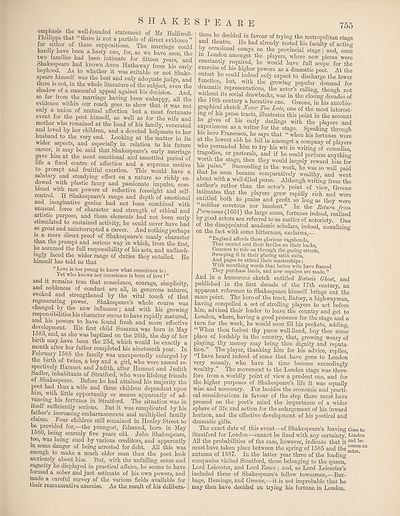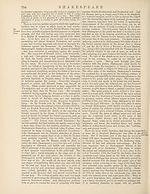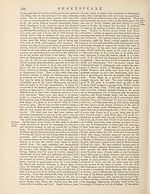Encyclopaedia Britannica > Volume 21, ROT-Siam
(765) Page 755
Download files
Complete book:
Individual page:
Thumbnail gallery: Grid view | List view

SHAKE
emphasis the well-founded statement of Mr Halliwell-
Phillipps that there is not a particle of direct evidence ”
for either of these suppositions. The marriage could
hardly have been a hasty one, for, as we have seen, the
two families had been intimate for fifteen years, and
Shakespeare had known Anne Hathaway from his’ early
boyhood. As to whether it was suitable or not Shake¬
speare himself was the best and only adequate judge, and
there is not, in the whole literature of the subject, even the
shadow of a successful appeal against his decision. And,
so far from the marriage having been unhappy, all the
evidence within our reach goes to show that it was not
only a union of mutual affection but a most fortunate
event for the poet himself, as well as for the wife and
mother who remained at the head of his family, venerated
and loved by her children, and a devoted helpmate to her
husband to the very end. Looking at the matter in its
wider aspects, and especially in relation to his future
career, it may be said that Shakespeare’s early marriage
gave him at the most emotional and unsettled period of
life a fixed centre of affection and a supreme motive
to prompt and fruitful exertion. This would have a
salutary and steadying effect on a nature so richly en¬
dowed with plastic fancy and passionate impulse, com¬
bined with rare powers of reflective foresight and self-
control. If Shakespeare’s range and depth of emotional
and imaginative genius had not been combined with
unusual force of character and strength of ethical and
artistic purpose, and these elements had not been early
stimulated to sustained activity, he could never have had
so great and uninterrupted a career. And nothing perhaps
is a more direct proof of Shakespeare’s manly character
than the prompt and serious way in which, from the first,
he assumed the full responsibility of his acts, and unflinch¬
ingly faced the wider range of duties they entailed. He
himself has told us that
“ Love is too young to know what conscience is:
Yet who knows not conscience is born of love ? ”
and it remains true that conscience, courage, simplicity,
and nobleness of conduct are all, in generous natures,
evoked and strengthened by the vital touch of that
regenerating power. Shakespeare’s whole course was
changed by the new influence; and with his growing
responsibilities his character seems to have rapidly matured,
and his powers to have found fresh and more effective
development. His first child Susanna was born in May
1583, and, as she was baptized on the 26th, the day of her
birth may have been the 23d, which would be exactly a
month after her father completed his nineteenth year. In
I ebruary 1585 the family was unexpectedly enlarged by
the birth of twins, a boy and a girl, who were named re¬
spectively Hamnet and Judith, after Hamnet and Judith
Sadler, inhabitants of Stratford, who were lifelong friends
of Shakespeare. Before he had attained his majority the
poet had thus a wife and three children dependent upon
him,. with. little opportunity or means apparently of ad¬
vancing his fortunes in Stratford. The situation was in
itself sufficiently serious. But it was complicated by his
father s increasing embarrassments and multiplied family
claims. . Four children still remained in Henley Street to
be provided for,—the youngest, Edmund, born in May
1580, being scarcely five years old. John Shakespeare,
too, was being sued by various creditors, and apparently
in some danger of being arrested for debt. All this was
enough to make a much older man than the poet look
anxiously about him. But, with the unfailing sense and
sagacity he displayed in practical affairs, he seems to have
formed a sober and just estimate of his own powers, and
made a careful survey of the various fields available for
their remunerative exercise. As the result of his delibera-
! P E A R E 755
turns he decided in favour of trying the metropolitan stage
and theatre. He had already tested his faculty of acting
. y occasional essays on the provincial stage; and, once
m ondon amongst the players, where new pieces were
constantly required, he would have full scope' for the
exercise of his higher powers as a dramatic poet. At the
outset he could indeed only expect to discharge the lower
tunction, but, with the growing popular demand for
dramatic representations, the actor’s calling, though not
without As social drawbacks, was in the closing decades of
the loth century a lucrative one. Greene, in his autobio¬
graphical sketch Arsver Too Late, one of the most interest¬
ing or his prose tracts, illustrates this point in the account
he gives of his early dealings with the players and
experiences as a writer for the stage. Speaking through
Francesco, lie says that fcC when his fortunes were
at the lowest ebb he fell in amongst a company of players
who persuaded him to try his wit in writing of comedies
ragedies, or pastorals, and if he could perform anything
worth the^stage, then they would largely reward him for
his pains.” Succeeding in the work, he was so well paid
that he soon became comparatively wealthy, and went
about with a well-filled purse. Although writing from the
author’s rather than the actor’s point of view, Greene
intimates that the players grew rapidly rich and were
entitled both to praise and profit so long as they were
neither covetous nor insolent.” In the Return from
Parnassus (1601) the large sums, fortunes indeed, realized
by good actors are referred to as matter of notoriety. One
of the disappointed academic scholars, indeed, moralizing
on the fact with some bitterness, exclaims,—
“ England affords those glorious vagabonds,
That carried erst their fardles on their backs,
Coursers to ride on through the gazing streets,
Sweeping it in their glaring satin suits,
And pages to attend their masterships :
With mouthing words that better wits have framed
They purchase lands, and now esquires are made.”
And.in a humorous sketch entitled Ratseis Ghost, and
published in the first decade of the 17th century, an
apparent reference to Shakespeare himself brings out the
same point. The hero of the tract, Ratsey, a highwayman,
having compelled a set of strolling players to act before
him, advised their leader to leave the country and get to
London, where, having a good presence for the stage and a
turn for the work, he would soon fill his pockets, adding,
“When thou feelest thy purse well-lined, buy thee some
place of lordship in the country, that, growing weary of
playing, thy money may bring thee dignity and reputa¬
tion.” The player, thanking him for his advice, replies,
“I have heard indeed of some that have gone to London
very meanly, who have in time become exceedingly
wealthy.” The movement to the London stage was there¬
fore from a worldly point of view a prudent one, and for
the higher purposes of Shakespeare’s life it was equally
wise and necessary. For besides the economic and practi¬
cal considerations in favour of the step there must have
pressed on the poet’s mind the importance of a wider
sphere of life and action for the enlargement of his inward
horizon, and the effective development of his poetical and
dramatic gifts.
The exact date of this event—of Shakespeare’s leaving Goes to
Stratford for London—cannot be fixed with any certainty. London
All the probabilities of the case, however, indicate that it and lje'
must have taken place between the spring of 1585 and the actor8 ^
autumn of 1587. In the latter year three of the leading^ °r’
companies visited Stratford, those belonging to the queen,
Lord Leicester, and Lord Essex; and, as Lord Leicester’s
included three of Shakespeare’s fellow townsmen,'—Bur¬
bage, Heminge, and Greene,—it is not improbable that he
may then have decided on trying his fortune in London.
emphasis the well-founded statement of Mr Halliwell-
Phillipps that there is not a particle of direct evidence ”
for either of these suppositions. The marriage could
hardly have been a hasty one, for, as we have seen, the
two families had been intimate for fifteen years, and
Shakespeare had known Anne Hathaway from his’ early
boyhood. As to whether it was suitable or not Shake¬
speare himself was the best and only adequate judge, and
there is not, in the whole literature of the subject, even the
shadow of a successful appeal against his decision. And,
so far from the marriage having been unhappy, all the
evidence within our reach goes to show that it was not
only a union of mutual affection but a most fortunate
event for the poet himself, as well as for the wife and
mother who remained at the head of his family, venerated
and loved by her children, and a devoted helpmate to her
husband to the very end. Looking at the matter in its
wider aspects, and especially in relation to his future
career, it may be said that Shakespeare’s early marriage
gave him at the most emotional and unsettled period of
life a fixed centre of affection and a supreme motive
to prompt and fruitful exertion. This would have a
salutary and steadying effect on a nature so richly en¬
dowed with plastic fancy and passionate impulse, com¬
bined with rare powers of reflective foresight and self-
control. If Shakespeare’s range and depth of emotional
and imaginative genius had not been combined with
unusual force of character and strength of ethical and
artistic purpose, and these elements had not been early
stimulated to sustained activity, he could never have had
so great and uninterrupted a career. And nothing perhaps
is a more direct proof of Shakespeare’s manly character
than the prompt and serious way in which, from the first,
he assumed the full responsibility of his acts, and unflinch¬
ingly faced the wider range of duties they entailed. He
himself has told us that
“ Love is too young to know what conscience is:
Yet who knows not conscience is born of love ? ”
and it remains true that conscience, courage, simplicity,
and nobleness of conduct are all, in generous natures,
evoked and strengthened by the vital touch of that
regenerating power. Shakespeare’s whole course was
changed by the new influence; and with his growing
responsibilities his character seems to have rapidly matured,
and his powers to have found fresh and more effective
development. His first child Susanna was born in May
1583, and, as she was baptized on the 26th, the day of her
birth may have been the 23d, which would be exactly a
month after her father completed his nineteenth year. In
I ebruary 1585 the family was unexpectedly enlarged by
the birth of twins, a boy and a girl, who were named re¬
spectively Hamnet and Judith, after Hamnet and Judith
Sadler, inhabitants of Stratford, who were lifelong friends
of Shakespeare. Before he had attained his majority the
poet had thus a wife and three children dependent upon
him,. with. little opportunity or means apparently of ad¬
vancing his fortunes in Stratford. The situation was in
itself sufficiently serious. But it was complicated by his
father s increasing embarrassments and multiplied family
claims. . Four children still remained in Henley Street to
be provided for,—the youngest, Edmund, born in May
1580, being scarcely five years old. John Shakespeare,
too, was being sued by various creditors, and apparently
in some danger of being arrested for debt. All this was
enough to make a much older man than the poet look
anxiously about him. But, with the unfailing sense and
sagacity he displayed in practical affairs, he seems to have
formed a sober and just estimate of his own powers, and
made a careful survey of the various fields available for
their remunerative exercise. As the result of his delibera-
! P E A R E 755
turns he decided in favour of trying the metropolitan stage
and theatre. He had already tested his faculty of acting
. y occasional essays on the provincial stage; and, once
m ondon amongst the players, where new pieces were
constantly required, he would have full scope' for the
exercise of his higher powers as a dramatic poet. At the
outset he could indeed only expect to discharge the lower
tunction, but, with the growing popular demand for
dramatic representations, the actor’s calling, though not
without As social drawbacks, was in the closing decades of
the loth century a lucrative one. Greene, in his autobio¬
graphical sketch Arsver Too Late, one of the most interest¬
ing or his prose tracts, illustrates this point in the account
he gives of his early dealings with the players and
experiences as a writer for the stage. Speaking through
Francesco, lie says that fcC when his fortunes were
at the lowest ebb he fell in amongst a company of players
who persuaded him to try his wit in writing of comedies
ragedies, or pastorals, and if he could perform anything
worth the^stage, then they would largely reward him for
his pains.” Succeeding in the work, he was so well paid
that he soon became comparatively wealthy, and went
about with a well-filled purse. Although writing from the
author’s rather than the actor’s point of view, Greene
intimates that the players grew rapidly rich and were
entitled both to praise and profit so long as they were
neither covetous nor insolent.” In the Return from
Parnassus (1601) the large sums, fortunes indeed, realized
by good actors are referred to as matter of notoriety. One
of the disappointed academic scholars, indeed, moralizing
on the fact with some bitterness, exclaims,—
“ England affords those glorious vagabonds,
That carried erst their fardles on their backs,
Coursers to ride on through the gazing streets,
Sweeping it in their glaring satin suits,
And pages to attend their masterships :
With mouthing words that better wits have framed
They purchase lands, and now esquires are made.”
And.in a humorous sketch entitled Ratseis Ghost, and
published in the first decade of the 17th century, an
apparent reference to Shakespeare himself brings out the
same point. The hero of the tract, Ratsey, a highwayman,
having compelled a set of strolling players to act before
him, advised their leader to leave the country and get to
London, where, having a good presence for the stage and a
turn for the work, he would soon fill his pockets, adding,
“When thou feelest thy purse well-lined, buy thee some
place of lordship in the country, that, growing weary of
playing, thy money may bring thee dignity and reputa¬
tion.” The player, thanking him for his advice, replies,
“I have heard indeed of some that have gone to London
very meanly, who have in time become exceedingly
wealthy.” The movement to the London stage was there¬
fore from a worldly point of view a prudent one, and for
the higher purposes of Shakespeare’s life it was equally
wise and necessary. For besides the economic and practi¬
cal considerations in favour of the step there must have
pressed on the poet’s mind the importance of a wider
sphere of life and action for the enlargement of his inward
horizon, and the effective development of his poetical and
dramatic gifts.
The exact date of this event—of Shakespeare’s leaving Goes to
Stratford for London—cannot be fixed with any certainty. London
All the probabilities of the case, however, indicate that it and lje'
must have taken place between the spring of 1585 and the actor8 ^
autumn of 1587. In the latter year three of the leading^ °r’
companies visited Stratford, those belonging to the queen,
Lord Leicester, and Lord Essex; and, as Lord Leicester’s
included three of Shakespeare’s fellow townsmen,'—Bur¬
bage, Heminge, and Greene,—it is not improbable that he
may then have decided on trying his fortune in London.
Set display mode to:
![]() Universal Viewer |
Universal Viewer | ![]() Mirador |
Large image | Transcription
Mirador |
Large image | Transcription
Images and transcriptions on this page, including medium image downloads, may be used under the Creative Commons Attribution 4.0 International Licence unless otherwise stated. ![]()
| Encyclopaedia Britannica > Encyclopaedia Britannica > Volume 21, ROT-Siam > (765) Page 755 |
|---|
| Permanent URL | https://digital.nls.uk/193637224 |
|---|
| Attribution and copyright: |
|
|---|---|
| Shelfmark | EB.17 |
|---|---|
| Description | Ten editions of 'Encyclopaedia Britannica', issued from 1768-1903, in 231 volumes. Originally issued in 100 weekly parts (3 volumes) between 1768 and 1771 by publishers: Colin Macfarquhar and Andrew Bell (Edinburgh); editor: William Smellie: engraver: Andrew Bell. Expanded editions in the 19th century featured more volumes and contributions from leading experts in their fields. Managed and published in Edinburgh up to the 9th edition (25 volumes, from 1875-1889); the 10th edition (1902-1903) re-issued the 9th edition, with 11 supplementary volumes. |
|---|---|
| Additional NLS resources: |
|

